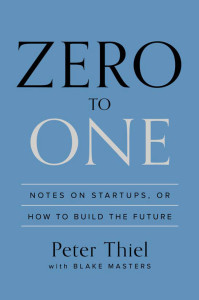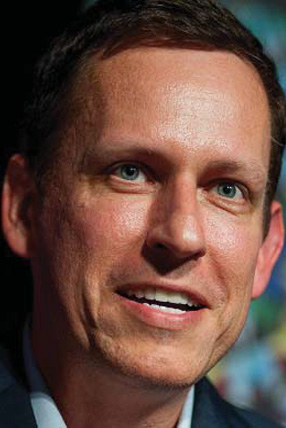Dozens of books telling start-up entrepreneurs how to succeed have been published in the last few years with most of them not saying anything new. Peter Thiel’s Zero to One – Notes on Startups, or How to Build The Future – is by far one of the best books for the start-ups, confused and struggling entrepreneurs and surprisingly, for indolent economists.
When the contrarian, controversial and haughty economist Nissim Taleb says it is a ‘classic’ and should be read at least three times to absorb its essence, it should be a serious must-read.
A book by someone who practices what he preaches and goes on to found, build and invest in companies that are path-breakers like Paypal and Facebook – then it is a book that cannot be missed.
This book is primarily for those who want to create a NEW world, hence the title Zero to One – It tells you how to get there. Peter insists that this book is not a manual or a record of knowledge but an exercise in thinking. “Because that is what a startup has to do – question received ideas and rethink business from scratch.”
Peter’s intent in writing this book is laudable – to spread his learning, beliefs, and experiences beyond
Stanford or Silicon Valley. This book is NOT for the faint-hearted, who believe in the following: It’s okay to be a copycat if the market size is big; be happy to be an also ran as long as you are making money;
Here are a few powerful insights I could pick. I could relate to them both as an entrepreneur and a student of Economics and public policy:
• It is better to risk boldness than triviality (As against Make Incremental Advances)
• A bad plan is better than no plan (As against Stay lean and fl exible)
• Competitive markets destroy profits (As against Improve on the competition)
• Sales matters just as much as product (As against Focus on product – a good product will sell itself)
• If you want to create and capture lasting value, don’t build an undiff erentiated commodity business.
Monopoly is Good!
This is a shocking statement at first, but Peter’s convincing argument hits people grown up on socialistic moorings. “Creative monopolists give customers more choices by adding entirely new categories of abundance to the world. They aren’t just good for the rest of society they’re powerful engines for making it better.”
“If the tendency of monopoly businesses were to hold back progress, they would be dangerous and we’d be right to oppose them. But the history of progress is a history of better monopoly businesses replacing incumbents.”
“So why are economists obsessed with competition as an ideal state? It’s a relic of history….We preach competition, internalize its necessity, and enact its commandments: as a result, we trap ourselves within
it – even though the more we compete, the less we gain.” He adds: “For a company to be valuable it must
grow and endure, but many entrepreneurs focus only on short-term growth.”
Peter goes on to explain how to build a monopoly – start small and monopolize. And “as you craft a plan to expand to adjacent markets, don’t disrupt: avoid competition as much as possible.”
Be the Last Mover
Peter is not much of a proponent of the ‘first mover advantage, but moving first should be a tactic, not a goal. What really matters is generating cash flows in the future – “Being the first mover doesn’t do you any good if someone else comes along and unseats you. It’s much better to be the last mover – to make the last great development in a specific market and enjoy years or even decades of monopoly profi ts.” But what’s important, he says, “is to dominate a niche and scale up from there, toward your long-term goal. He says, here, business is like chess – You must study the endgame before everything else.”
You Are Not a Lottery Ticket
This is the book’s most compelling chapter. Peter says that all the greats who have said how luck was a big factor in their success, were “strategically humble”.
He quotes Ralph Waldo Emerson who wrote: “Shallow men believe in luck, believe in circumstances. . . . Strong men believe in cause and effect. “No one pretended that misfortune didn’t exist, but prior generations believed in making their own luck by working hard.”
Interestingly, he points out that ‘luck’ is always referred in the past tense. “Far more important are questions about the future: Is it a matter of chance or design. . . . If you expect an indefinite future ruled by randomness, you’ll give up on trying to master it.” It’s worth checking out Peter’s brilliant illustration
of what he means by ‘Indefinite Pessimism, Definite Pessimism, Indefi nite Optimism and Definite
Optimism’. Check out where you stand.
 It becomes clear what Peter is trying to convince this generation to do – to believe in the merit of planning – be it politics, life or business. He writes: “In Philosophy, Politics and, business too, arguing over process has become a way to endlessly defer making concrete plans for a better future. . . . How can the future get better if no one plans for it? . . . We have to find our way back to a defi nite future, and the Western world needs nothing short of a cultural
It becomes clear what Peter is trying to convince this generation to do – to believe in the merit of planning – be it politics, life or business. He writes: “In Philosophy, Politics and, business too, arguing over process has become a way to endlessly defer making concrete plans for a better future. . . . How can the future get better if no one plans for it? . . . We have to find our way back to a defi nite future, and the Western world needs nothing short of a cultural
revolution to do it.”
Just like every author’s favorite example is Steve Jobs, Peter too gives him a close look, but unlike most others, he sees Jobs diff erently. He writes: “The greatest think Jobs designed was his business. . . . Jobs saw that you can change the world through careful planning, not by listening to focus group feedback or copying others’ successes.”
He credits the success of Facebook to Mark Zuckerberg’s careful planning, unlike Yahoo which seems to be still trying to fi gure out where it wants to be.
VCs Play the Game of Lottery Ticket
Peter shows how pissed off he is with the way venture capitalists think. “Whenever you shift from the substance of a business to the fi nancial question of whether or not it fi ts into a diversifi ed hedging strategy, venture investing starts to look a lot like buying lottery tickets. And once you think that you’re playing the lottery, you’ve already psychologically prepared to lose.” He wants them instead to find the handful of companies that will successfully go from 0 to 1 and back them with every resource.
Practical Tips
This book is indeed one of the most practical manuals one can lay their hands on; yet, it’s not written like one. It is an easy read, but not a racy read. Here are some:
• Founders should share a prehistory before they start a company together – otherwise they’re just rolling dice.
• Serendipity and even free-form chaos at the workplace supposed to help disrupt old rules, but you also need a structure to help keep everyone aligned for the long-term.
• In the boardroom, less is more – for effective oversight
• Hiring consultants, part-time employees don’t work – they’ll be biased to claim value in the near term, not help you create more in the future.
• Everyone working remotely should be avoided because misalignment can creep in whenever colleagues aren’t together full-time.
• No company has a culture; every company is a culture. A startup is a team on a mission, and a good culture is just what that looks like on the inside.
• From the outside, everyone in your company should be diff erent in the same way; On the inside, every individual should be sharply distinguished by her work.
• The best sales is hidden.
• Never hire a tech CEO who wears a suit.
• An entrepreneur cannot benefit from the macroscale insight unless his own plans begin at the micro-scale.
• Creation of new value cannot be reduced to a formula and applied by professionals – it needs the founders to do it
• We should be more tolerant of founders who seem strange or extreme: we need unusual individuals to lead companies beyond mere incrementalism.
There’s very little to disagree with Peter on the central construct of this book. Nit-pickers could pick a small
hole here and there, but largely, this is for those who want to change the world, make a difference and of course, grow rich
If you are a student and want to drop your college to start a company, he will even fund you!








